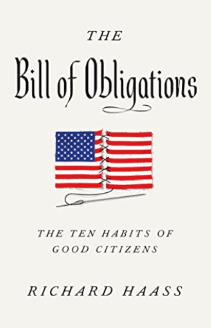By Jim Heffernan
237 Pages (63 pages notes and index)
Published Jan. 24, 2023
Goodreads 4.21 out of 5, 522 ratings
Available Cloud and Leaf Bookstore in Manzanita and Tillamook Public Library
Richard Haass is author of 15 books, long time president of Foreign Relations Council and served in one Democratic and 3 Republican administrations.
I found it very refreshing to find a short, well-written book with a wealth of good ideas and a shortage of academic language.
His book is divided into 2 parts, in Part I, the first 35 pages, he explores the deterioration of our democracy. He is often asked which is the most dangerous foreign threat we face, and he concludes that foreign threats pale before the danger of our decay within. He concludes we have become too concerned about rights and not nearly enough about obligations.
The second part of the book is devoted to the obligations we citizens have so sadly neglected.
He lists them as:
(1.) Be Informed,
(2.) Get Involved,
(3.) Stay Open to Compromise,
(4.) Remain Civil,
(5.) Reject Violence,
(6.) Value Norms,
(7.) Promote the Common Good,
(8.) Respect Government Service,
(9.) Support the Teaching of Civics, and
(10.) Put the country and American democracy before party and person.
Each of the obligations is given a short chapter where he explains his views and points out our shortcomings in present day society. I was a trifle surprised how much I agreed with the views of a man who was conservative Republican until 2020.
I thought it was significant that he listed “Be Informed” as our first obligation and concluded with “Put the country and American democracy before party and person”. If we read and heed just those two chapters, our country, and its future, would be greatly improved.
He probably sums up his book better than I can on this excerpt from page 155.
“The central argument of this book is that American democracy will endure only if obligations join rights at the core of a widely shared understanding of citizenship. By definition, obligations are behaviors that should happen but are not required as a matter of law. The motive for signing up to and practicing a set of obligations even when fulfilling them is not of direct or immediate benefit is because it will encourage behaviors, norms, relationships, and arrangements that over time will buttress our democracy and prove to be of benefit to ourselves, the society of which we are a member, and the country in which we are a citizen.”
As always, this article reflects only my opinion and I welcome discussion at codger817 AT gmail DOT com (replace with @ and ., save us from spam!)


